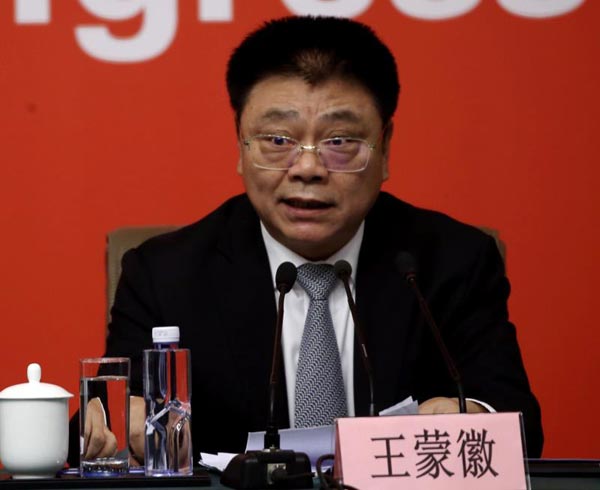Expanded rental market could help stabilize real estate prices

 |
| Wang Menghui, minister of housing and urban-rural development, speaks at a news conference of the 19th National Congress of the Communist Party of China in Beijing, Oct 22, 2017. [Photo by Edmond Tang/China Daily] |
ACCORDING TO A STATEMENT OF THE NATIONAL BUREAU OF STATISTICS, China's property sector accounted for a smaller proportion of the economy in the third quarter of the year, thanks to a series of purchase restrictions adopted by local governments as cooling measures. Beijing Youth Daily commented on Saturday:
The latest NBS report marks a much-anticipated turning point in China's real estate market. The property sector registered 3.9 percent growth in the third quarter, a year-on-year decline of 4.9 percentage points. And the added value of the property sector amounted to 1.32 trillion yuan ($200 billion) between July and September, contributing 6.23 percent of the country's GDP; the figure in the second quarter was 6.86 percent.
The dwindling proportion of property sales in China's economic growth shows that the restrictions on house purchases, which have been ramped up nationwide to prevent volatility in the real estate market, are now taking effect.
Yet property sales, despite the rounds of administrative intervention, have not plummeted over the past year, while real estate development growth reached 8.1 percent in the first three quarters, 2.3 percentage points higher than a year ago, highlighting that surging property prices have been contained without making waves in the market.
Policy intervention, as shown in the preliminary success in shrinking the real estate bubble, is not about stifling the property market in exchange for falling housing prices. As an integral part of the economy, real estate still matters a great deal to the country's economic well-being. A balance can be struck between keeping housing prices at controllable levels and tapping the economic potential of the real estate market.
At the core of China's real estate policies is curbing market speculation and providing affordable housing to citizens. That means more attention should be paid to the development of the rental market.
As Wang Menghui, head of the Ministry of Housing and Urban-Rural Development, has said, as property developers refrain from over-exploiting the real estate market and local governments strive to alleviate their reliance on revenue from land sales, an established, healthy rental market would help further stabilize the market.
- Housing sales contract dispute between Hunan-based Furongguo Group Co, Ltd, Changsha-based Changping Building Material Trading Co, Ltd and Hunan-based Xiangtong Property Development Co, Ltd
- Beijing issues construction guideline for joint ownership housing
- Online auction of unfinished affordable housing project aborted after zero bids
- Beijing's first joint ownership housing program lottery opens
- How fast can housing investment grow?


































